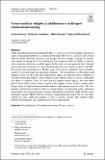Formal contracts mitigate social dilemmas in multi-agent reinforcement learning
Author(s)
Haupt, Andreas; Christoffersen, Phillip; Damani, Mehul; Hadfield-Menell, Dylan
Download10458_2024_Article_9682.pdf (2.592Mb)
Publisher with Creative Commons License
Publisher with Creative Commons License
Creative Commons Attribution
Terms of use
Metadata
Show full item recordAbstract
Multi-agent Reinforcement Learning (MARL) is a powerful tool for training autonomous agents acting independently in a common environment. However, it can lead to sub-optimal behavior when individual incentives and group incentives diverge. Humans are remarkably capable at solving these social dilemmas. It is an open problem in MARL to replicate such cooperative behaviors in selfish agents. In this work, we draw upon the idea of formal contracting from economics to overcome diverging incentives between agents in MARL. We propose an augmentation to a Markov game where agents voluntarily agree to binding transfers of reward, under pre-specified conditions. Our contributions are theoretical and empirical. First, we show that this augmentation makes all subgame-perfect equilibria of all Fully Observable Markov Games exhibit socially optimal behavior, given a sufficiently rich space of contracts. Next, we show that for general contract spaces, and even under partial observability, richer contract spaces lead to higher welfare. Hence, contract space design solves an exploration-exploitation tradeoff, sidestepping incentive issues. We complement our theoretical analysis with experiments. Issues of exploration in the contracting augmentation are mitigated using a training methodology inspired by multi-objective reinforcement learning: Multi-Objective Contract Augmentation Learning. We test our methodology in static, single-move games, as well as dynamic domains that simulate traffic, pollution management, and common pool resource management.
Date issued
2024-10-18Department
Massachusetts Institute of Technology. Computer Science and Artificial Intelligence LaboratoryJournal
Autonomous Agents and Multi-Agent Systems
Publisher
Springer US
Citation
Haupt, A., Christoffersen, P., Damani, M. et al. Formal contracts mitigate social dilemmas in multi-agent reinforcement learning. Auton Agent Multi-Agent Syst 38, 51 (2024).
Version: Final published version